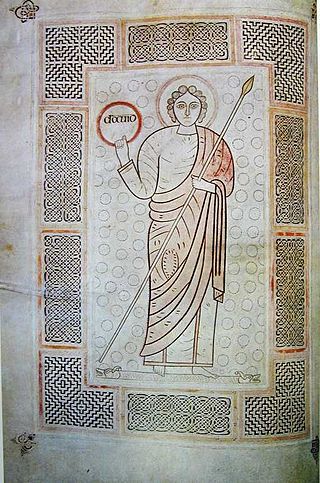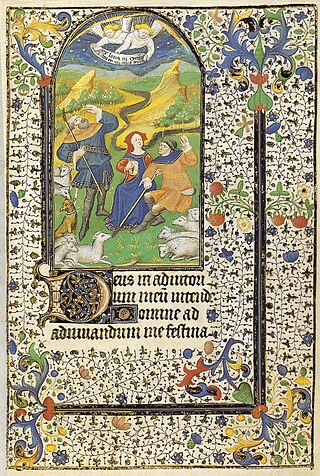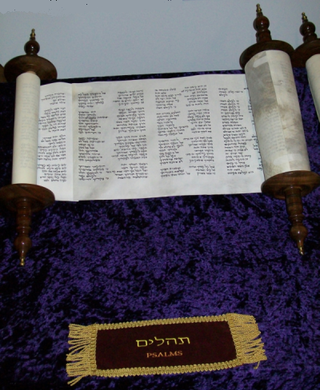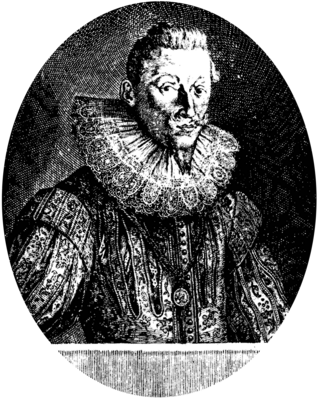
Vespro della Beata Vergine, SV 206, is a musical setting by Claudio Monteverdi of the evening vespers on Marian feasts, scored for soloists, choirs, and orchestra. It is an ambitious work in scope and in its variety of style and scoring, and has a duration of around 90 minutes. Published in Venice as Sanctissimae Virgini Missa senis vocibus ac Vesperae pluribus decantandae, cum nonnullis sacris concentibus, ad Sacella sive Principum Cubicula accommodata, it is sometimes called Monteverdi's Vespers of 1610.

Psalm 23 is the 23rd psalm of the Book of Psalms, beginning in English in the King James Version: "The Lord is my shepherd". In Latin, it is known by the incipit, "Dominus regit me". The Book of Psalms is part of the third section of the Hebrew Bible, and a book of the Christian Old Testament. In the slightly different numbering system used in the Greek Septuagint and Latin Vulgate translations of the Bible, this psalm is Psalm 22.
Egil Hovland was a Norwegian composer.

Psalm 100 is the 100th psalm in the Book of Psalms in the Hebrew Bible. In English, it is translated as "Make a joyful noise unto the Lord, all ye lands" in the King James Version (KJV), and as "O be joyful in the Lord, all ye lands" in the Book of Common Prayer (BCP). Its Hebrew name is מִזְמוֹר לְתוֹדָה, 'Mizmor l'Todah' and it is subtitled a "Psalm of gratitude confession". In the slightly different numbering system in the Greek Septuagint version of the Bible, and in the Latin Vulgate, this psalm is Psalm 99. In the Vulgate, it begins Jubilate Deo, or Jubilate, which also became the title of the BCP version.

Psalm 126 is the 126th psalm of the Book of Psalms, beginning in English in the King James Version: "When the Lord turned again the captivity of Zion, we were like them that dream". In Latin, it is known as In convertendo Dominus. It is one of the fifteen Songs of Ascent in the Book of Psalms whose opening words in Hebrew are "Shir HaMaalot". In the slightly different numbering system used in the Greek Septuagint version of the Bible and in the Latin Vulgate, this psalm is Psalm 125.

Psalm 93 is the 93rd psalm of the Book of Psalms, beginning in English in the King James Version: "The LORD reigneth, he is clothed with majesty". The Latin wording is Dominus regnavit, decorem indutus est. The Book of Psalms is part of the Hebrew Bible and the Christian Old Testament. In the slightly different numbering system of the Greek Septuagint and Latin Vulgate versions of the Bible, this psalm is Psalm 92. It is the first of a series of psalms which are called royal psalms as they praise God as King.

Psalm 13 is the 13th psalm of the Book of Psalms, beginning in English in the King James Version (KJV): "How long, O Lord". The Book of Psalms is part of the third section of the Hebrew Bible, and a book of the Christian Old Testament. In the Greek Septuagint and the Latin Vulgate, this psalm is Psalm 12 in a slightly different numbering system. In Latin, it is known as "Usquequo Domine".

Psalm 144 is the 144th psalm of the Book of Psalms, part of the final Davidic collection of psalms, comprising Psalms 138 to 145, which are specifically attributed to David in their opening verses. In the King James Version its opening words are "Blessed be the LORD my strength which teacheth my hands to war, and my fingers to fight". In Latin, it is known as "Benedictus Dominus".

Psalm 122 is the 122nd psalm of the Book of Psalms, beginning in English in the King James Version: "I was glad" and in Latin entitled Laetatus sum. It is attributed to King David and one of the fifteen psalms described as A song of ascents. Its title, I was glad, is reflected in a number of choral introits by various composers.

Psalm 70 is the 70th psalm of the Book of Psalms, beginning in English in the King James Version: "Make haste, O God, to deliver me". The Book of Psalms is part of the third section of the Hebrew Bible, and a book of the Christian Old Testament. In the slightly different numbering system used in the Greek Septuagint and Latin Vulgate translations of the Bible, this psalm is Psalm 69. In Latin, it is known as "Deus, in adiutorium meum intende".

Psalm 81 is the 81st psalm of the Book of Psalms, beginning in English in the King James Version: "Sing aloud unto God our strength". In the slightly different numbering system used in the Greek Septuagint and Latin Vulgate translations of the Bible, this psalm is Psalm 80. In Latin, it is known as "Exultate deo adiutori nostro". It is one of the 12 Psalms of Asaph. Its themes relate to celebration and repentance. In the New King James Version its sub-title is "An Appeal for Israel's Repentance".
Psalm 86 is the 86th psalm of the Book of Psalms. It is attributed to David. In the slightly different numbering system used in the Greek Septuagint and Latin Vulgate translations of the Bible, this psalm is Psalm 85.

Psalm 97 is the 97th psalm of the Book of Psalms, beginning in the English of the King James Version: "The Lord reigneth; let the earth rejoice", also as "The Lord is King". The Book of Psalms is part of the third section of the Hebrew Bible, and a book of the Christian Old Testament. In Latin, it is known as "Dominus regnavit exultet terra". The psalm is a hymn psalm; the Jerusalem Bible calls it an "eschatological hymn".

Psalm 111 is the 111th psalm of the Book of Psalms, beginning in English in the King James Version: "Praise ye the LORD. I will praise the LORD with my whole heart". In the slightly different numbering system used in the Greek Septuagint and Latin Vulgate translations of the Bible, this psalm is Psalm 110. In Latin, it is known as Confitebor tibi Domine. It is a psalm "in praise of the divine attributes". This psalm, along with Psalm 112, is acrostic by phrase, that is, each 7-9 syllable phrase begins with a letter of the Hebrew alphabet in order. Psalm 119 is also acrostic, with each eight-verse strophe commencing with a letter of the Hebrew alphabet in order. The Jerusalem Bible describes Psalm 112, "in praise of the virtuous", as "akin to this psalm in doctrine, style and poetic structure.

Psalm 116 is the 116th psalm of the Book of Psalms, beginning in English in the King James Version: "I love the LORD, because he hath heard my voice and my supplications". It is part of the Egyptian Hallel sequence in the Book of Psalms.

Psalm 127 is the 127th psalm of the Book of Psalms, beginning in English in the King James Version: "Except the Lord build the house". In Latin, it is known by the incipit of its first 2 words, "Nisi Dominus". It is one of 15 "Songs of Ascents" and the only one among them attributed to Solomon rather than David.
In convertendo Dominus, Op. 32, is the musical setting of In convertendo Dominus, written by Jules Van Nuffel in 1926 for a mixed choir and organ.

Cantiones sacrae, Op. 4, is a collection of forty different pieces of vocal sacred music on Latin texts, composed by Heinrich Schütz and first published in 1625. The pieces have individual numbers 53 to 93 in the Schütz-Werke-Verzeichnis (SWV), the catalogue of his works. The general title Cantiones sacrae was common at the time and was used by many composers, including Palestrina, Byrd and Tallis and Hans Leo Hassler (1591).

In convertendo Dominus, sometimes referred to as In convertendo, is a setting by Jean-Philippe Rameau of In convertendo Dominus, the Latin version of Psalm 126,. It is listed as RCT 14 in the Rameau Catalogue Thématique of Sylvie Bouissou and Denis Herlin.
The Lord Is My Shepherd is a sacred choral composition by John Rutter, a setting of Psalm 23. The work was published by Oxford University Press in 1978. Marked "Slow but flowing", the music is in C major and 2/4 time. Rutter composed it for Mel Olson and the Chancel Choir of the First United Methodist Church in Omaha, Nebraska. He later included the work as a movement in his Requiem of 1985, then with orchestra or chamber ensemble.. In 1993, Rutter also made it part of his Psalmfest, a collection of nine psalms written over 20 years. For that version, he used also soloists.















